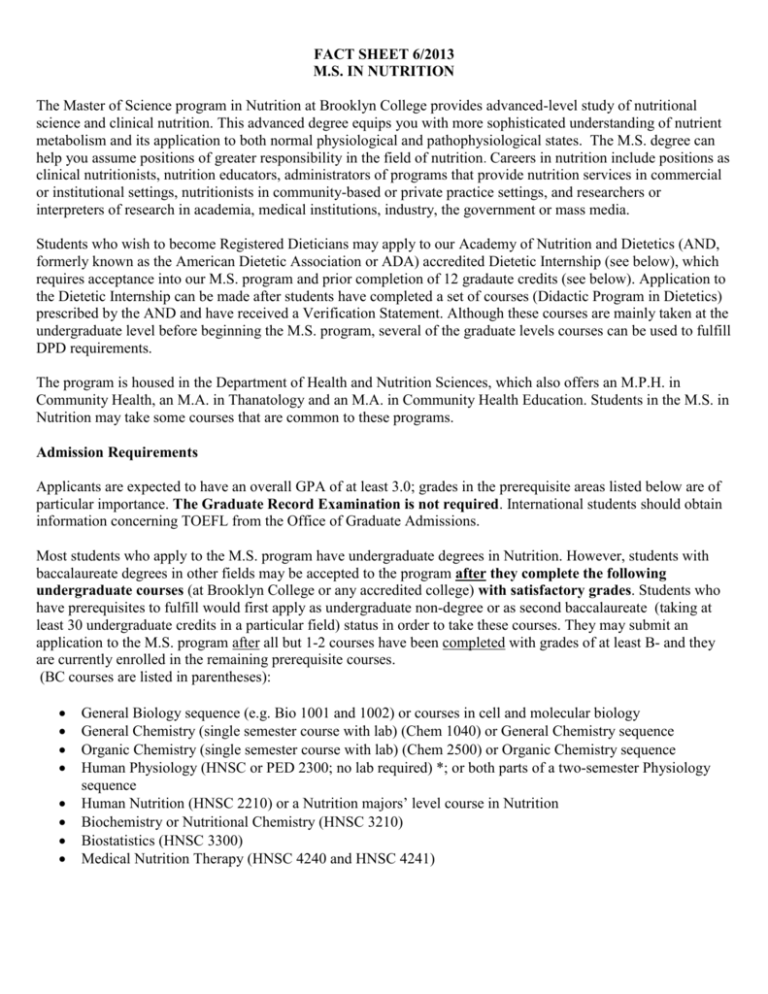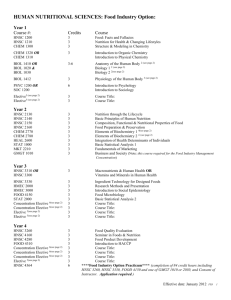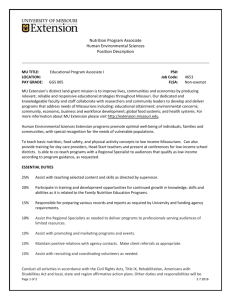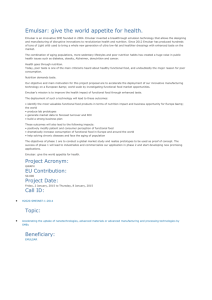MS in Nutrition Fact Sheet
advertisement

FACT SHEET 6/2013 M.S. IN NUTRITION The Master of Science program in Nutrition at Brooklyn College provides advanced-level study of nutritional science and clinical nutrition. This advanced degree equips you with more sophisticated understanding of nutrient metabolism and its application to both normal physiological and pathophysiological states. The M.S. degree can help you assume positions of greater responsibility in the field of nutrition. Careers in nutrition include positions as clinical nutritionists, nutrition educators, administrators of programs that provide nutrition services in commercial or institutional settings, nutritionists in community-based or private practice settings, and researchers or interpreters of research in academia, medical institutions, industry, the government or mass media. Students who wish to become Registered Dieticians may apply to our Academy of Nutrition and Dietetics (AND, formerly known as the American Dietetic Association or ADA) accredited Dietetic Internship (see below), which requires acceptance into our M.S. program and prior completion of 12 gradaute credits (see below). Application to the Dietetic Internship can be made after students have completed a set of courses (Didactic Program in Dietetics) prescribed by the AND and have received a Verification Statement. Although these courses are mainly taken at the undergraduate level before beginning the M.S. program, several of the graduate levels courses can be used to fulfill DPD requirements. The program is housed in the Department of Health and Nutrition Sciences, which also offers an M.P.H. in Community Health, an M.A. in Thanatology and an M.A. in Community Health Education. Students in the M.S. in Nutrition may take some courses that are common to these programs. Admission Requirements Applicants are expected to have an overall GPA of at least 3.0; grades in the prerequisite areas listed below are of particular importance. The Graduate Record Examination is not required. International students should obtain information concerning TOEFL from the Office of Graduate Admissions. Most students who apply to the M.S. program have undergraduate degrees in Nutrition. However, students with baccalaureate degrees in other fields may be accepted to the program after they complete the following undergraduate courses (at Brooklyn College or any accredited college) with satisfactory grades. Students who have prerequisites to fulfill would first apply as undergraduate non-degree or as second baccalaureate (taking at least 30 undergraduate credits in a particular field) status in order to take these courses. They may submit an application to the M.S. program after all but 1-2 courses have been completed with grades of at least B- and they are currently enrolled in the remaining prerequisite courses. (BC courses are listed in parentheses): General Biology sequence (e.g. Bio 1001 and 1002) or courses in cell and molecular biology General Chemistry (single semester course with lab) (Chem 1040) or General Chemistry sequence Organic Chemistry (single semester course with lab) (Chem 2500) or Organic Chemistry sequence Human Physiology (HNSC or PED 2300; no lab required) *; or both parts of a two-semester Physiology sequence Human Nutrition (HNSC 2210) or a Nutrition majors’ level course in Nutrition Biochemistry or Nutritional Chemistry (HNSC 3210) Biostatistics (HNSC 3300) Medical Nutrition Therapy (HNSC 4240 and HNSC 4241) Degree Requirements 30 total credits plus additional credits for the thesis HNSC 7999) or Dietetic Internship (if so desired) 6 required courses (18 credits): o Nutritional Biochemistry HNSC 7210 o Micronutrients HNSC 7211 o Pathophysiology HNSC 7213 o Community Nutrition HNSC 7230 o Nutrition and Disease HNSC 7241 o Research Seminar HNSC 7930 Four elective courses (12 credits) are chosen from: HNSC 7220, 7232, 7233, 7221, 7222, 7223, 7224, 7212, 7240, 7231, 7200 (DI), 7201 (DI), 7172, 7183, 7120, 7161, 7234, 7935. During their first year in the program, students must take HNSC 7210 (Fall), 7211(Spring), 7213, and 7930, which serve as the theoreticl background for other courses in the program. Students must maintain a GPA of at least 3.0; failure to do so will place the student on academic probation and failure to achieve a GPA of 3.0 within 9 creidts of the time they are placed on probation can lead to dismissal from the program. A GPA of at least 3.0 is also required for eligibility to take the comprehensive examination and for graduation. A student may retake courses (up to 6 credits total) for which a grade of F has been received with the new grade will replace the F in calculation of the GPA; the student must submit a form to use of the F Replacement Policy. A grade of INC must be resolved in the following semester or it will become FIN (equivalent to F), respectively. Exit Requirement: choice between a comprehensive examination or Master’s thesis. In addition to completion of course work with a GPA of at least 3.0, student must either pass a comprehensive examination or submit an acceptable M.S. thesis. The comprehensive examination is given in the Fall (November) and Spring (May) semesters. The exam consists of questions pertaining to the required courses HNSC 7210, 7211, 7230, 7241 and 7930. Students must complete all five courses with a grade of at least B in order to qualify to take the examination. It is recommended that students complete the required courses early in their programs and take the comprehensive examination soon after; you do not have to complete all course work in order to apply for the examination. Students apply for the exam online: 1. Sign in to the WebCentral Portal at https://portal.brooklyn.edu 2. Select the "eServices" tab 3. Look for the "Student Transactions" channel 4. Select the "Apply for a comprehensive exam" item in the Graduate Studies section Students will receive access to study material posted on Blackboard. Students taking the exam the first time will pass if the total grade is at least 70%. Students who fail the exam may apply to take the exam once again; students would then retake all areas in which the previous score was less than 70% and must pass EACH of the areas with a score of at least 70%. Students choosing the thesis must take HNSC 7930, work with a faculty advisor, submit a thesis title with the advisor’s approval, and register for HNSC 7999 by the time they expect to submit the completed thesis. It is recommended that students take HNSC 7935 after they complete 7930 in order to develop the thesis proposal. Once students select the examination (by taking it) or thesis (by registering for HNSC 7999) they may not change to the other option. Note that students must maintain matriculation (be registered for a course or pay “Maintenance of Matriculation”) until completion of the program. That includes the semester(s) in which the student submits the thesis or takes the comprehensive examination. Students who must miss a semester should file for a Leave of Absence in advance and can be readmitted when the college is notified of return the following semester. Students who do not file for a Leave of Absence but who miss a Fall or Spring semester must apply for Readmission. All requirements for the degree must be completed within seven years of the time the student begins to take graduate courses. Students must file for graduation with the Registrar before their last semester. STUDENTS ARE STRONGLY ADVISED to read both the general information in the Brooklyn College Graduate Bulletin and the information for students in the M.S. in Nutrition in the Department of Health and Nutrition Sciences. You may contact the Graduate Deputy Chairperson for Nutrition, Prof. Kathleen Axen: kaxen@brooklyn.cuny.edu for information and counselling. Dietetic Internship: In addition to the courses required for admission to the M.S., students must complete all didactic program in dietetic (DPD) requirements (see below) and obtain a signed Verification Statement from their DPD director. Applicants must be accepted into the MS program in Nutrition and complete four graduate courses, including HNSC 7213, 7240 and 7241, before beginning the Dietetic Internship. Applications to the DI are through the Academy of Nutrition and Dietetics (www.eatright.org) matching process. Students who intend to apply to the Dietetic Internship (DI) must complete the following additional undergraduate courses to meet Didactic Program in Dietetic (DPD) requirements. Note that for courses marked (*) graduate courses may be used to fulfill the content area: HNSC 2220 HNSC 2221 HNTR 2222 HNSC 2223 HNSC 2301 HNSC 3230* (3 cr) Food Science (HNSC 2210 prereq, Chem 1040 pre-or coreq, HNSC 2221 coreq) (1 cr) Food Science laboratory (HNSC 2220 coreq) (2 cr) Foods of Diverse Populations (HNSC 2210 prereq, HNSC 2223 co-req) Foods of Diverse Populations Laboratory (HNSC 2222 coreq) (2) Human Physiology Laboratory (2300 co-req) (3) Life Cycle Nutrition (HNSC 1100 and 2210 prereqs); the graduate course: HNSC 7231 (Developmental Nutrition) PLUS HNSC 7232 (Geriatric Nutrition) can also be used to fulfill this content area requirement. HNSC 3250 (4) Institutional Food Service Management (HNSC 2220 and 2221 prereqs) HNSC 4230* (4) Community Nutrition Education (HNSC 3230 prereq); the graduate course HNSC 7230 (Community Nutrition) can also be used to fulfill this content area requirement. HNSC 4210* (3) Advanced Nutrition (HNSC3210 and 330 prereqs); the graduate course HNSC 7211 (Micronutrients) can also be used to fulfill this content area requirement. HNSC 4300 (3) Organization, Administration, and Supervision of Health Services (HNSC 4230 pre- or coreq) HNSC 5290* (3) Seminar in Recent Trends in Nutrition (HNSC 2300, 3300, ENG 1012, HNSC 4240 pre- or coreq); the graduate course HNSC 7212 (Recent Developments in Nutrition) can also be used to fulfill this content area requirement. OTHER REQUIREMENTS BIO 3003 and 3004 (4) Microbiology lecture and laboratory. (BIO 1002 prereq) * Courses can be taken on the graduate level for credit toward the M.S. for students accepted to the graduate program. Graduate students who want to register for any of these undergraduate courses must first have a crossover form signed by Prof Axen. Once all DPD courses are completed with adequate grades students can be issued a “Verification Statement” to document completion of DPD requirements. The Director of the Didactic Program in Dietetics (the person who issues the Verification Statement) is Prof. Roseanne Schnoll. She is also the Director of the Dietetic Internship. For information on the DPD .or DI programs please contact Susan Jakuboski: nutrition@brooklyn.cuny.edu HNSC 7120X Epidemiology 45 hours; 3 credits Principles and application of epidemiological analysis, illustrations of incidence, distribution, multiple determinants, and control of disease. Methods of investigation. Sources, presentation, and interpretation of data. Prerequisite: an introductory course in epidemiology or an equivalent course. HNSC 7183X Health Counseling 45 hours; 3 credits Application of principles and methods of counseling to health problems. Case studies, identification of problems, techniques of interviewing. Prerequisite: A course in personal and community health. HNSC 7210X Nutritional Biochemistry 45 hours; 3 credits Emphasis on homeostatic mechanisms and hormonal controls of intermediary metabolism on a cellular level. Select topics related to the metabolic diseases and inborn errors of metabolism. Prerequisite: a course in advanced nutrition and a course in nutritional chemistry or biochemistry or permission of the chairperson HNSC 7211X Micronutrients 45 hours; 3 credits Physiological regulation of metabolism of vitamins and minerals; effects of deficiencies and excesses. Prerequisite: a course in nutrition and a course in biochemistry; or permission of the chairperson. HNSC 7212X Recent Developments in Nutrition 45 hours; 3 credits Critical examination of current literature and scientific research in nutrition. Impact of current nutritional developments relating to individual, family, and community well-being. Prerequisite: a graduate course in nutrition and a course in physiology and a course in statistics or permission of the chairperson. HNSC 7213X Human Pathophysiology 45 hours; 3 credits Etiology, pathogenesis, and clinical manifestations of human diseases that are treated by nutritional therapies. Prerequisite: a course in human physiology. HNSC 7220X Nutrition and World Food Problems 45 hours; 3 credits National and international nutritional conditions. Government problems, issues, policies concerning nutritional status of individuals and population groups. Regulation of food production and distribution in developing countries. Prerequisite: a course in nutrition or permission of the chairperson. HNSC 7221X Cultural Aspects of Foods 45 hours; 3 credits Foodways, the study of relationships of food and culture. Ethnic, geographic, economic, social, religious influences on food habits and practices of individuals and families. Prerequisite: a course in food science or nutrition or permission of the chairperson. HNSC 7222X Advanced Experimental Foods 15 hours lecture, 60 hours laboratory; 3 credits Research techniques in food science and their application to the study of selected problems in food marketing, preparation, service, storage. Opportunity for students to conduct individual experimental projects. Prerequisite: a minimum of 10 credits in courses in food science and nutrition and two laboratory courses in biology and/or chemistry or permission of the chairperson. HNSC 7223X Recent Developments in Foods 45 hours; 3 credits Review and evaluation of recent trends, issues, research in product development, food processing, distribution. Modern food technology, application, use. Prerequisite: 6 credits in courses in foods or permission of the chairperson. HNSC 7224X Organizational Management of Food 45 hours; 3 credits Decision-making skills involved in the field of food service management. Application of management theories to control of food costs, work simplification techniques, and management accountability in the food service system. Prerequisite: completion of the core requirements in the program in nutrition. HNSC 7230X Community Nutrition 45 hours; 3 credits Community and public health nutrition with focus on factors affecting food consumption of a community and nutritional problems of select groups. Consumption patterns, assessment techniques, intervention programs, and evaluation of programs (federal, state, and local). Prerequisite: a course in human nutrition and a course in life cycle, developmental or geriatric nutrition, or permission of the chairperson. HNSC 7231X Developmental Nutrition 45 hours; 3 credits Effects of nutritional factors on development from prenatal growth to adolescence. Topics include: placental transport of nutrients, causes of congenital defects, breast feeding vs. bottle feeding, factors affecting rate of growth and age at puberty, effects of nutritional deficiencies and excesses, and the relationship of nutrients to morphogenetic or biochemical processes. Prerequisite: a course in advanced nutrition and a course in physiology. HNSC 7232X Geriatric Nutrition 45 hours; 3 credits Recent knowledge of nutrition and human aging. Special emphasis on interactions of physiological stages, age, lifestyle, health, disease, and nutrition. Examination of research findings focusing on the relationship of nutrition to the structural and functional changes associated with the aging process. Prerequisite: a course in nutrition or permission of the chairperson. HNSC 7233X Nutrition and Behavior 45 hours; 3 credits The relationship between nutrient deprivation during critical growth periods and interactional and learning deficits and maladaptive behavior patterns. Behavioral disorders and nutrient needs and idiosyncrasies. Psychodietetics: determinants of psychological reactions to foods and evolving food behavior patterns. Prerequisite: one course in psychology and a course in human nutrition and a course in physiology. HNSC 7234X Nutrition and Exercise 30 hours plus conference; 3 credits Exploration of human nutritional requirements of exercise; the significance of intermediary metabolic pathways and the effect of dietary manipulation on exercise performance. (This course is the same as PEES 7279X [779X].) Prerequisite: a course in human or animal physiology and a course in exercise physiology or biochemistry. HNSC 7240X Assessment Techniques and Nutritional Care 45 hours; 3 credits Study of the components of nutritional assessment as the initial step in nutrition care process. Emphasis on comparative analysis of dietary intake methods, interpretation of clinical laboratory values, evaluation of anthropometric and body composition methods, retrieval of medical history/physical examination data. Prerequisite: a course in medical nutrition therapy and Health and Nutrition Sciences 7213X. HNSC 7241X Nutritional Aspects of Disease 45 hours; 3 credits Changes in requirements and utilization of nutrients; nutritional status of the individual during pathological states. Disease, malnutrition, and environmental pollution assaults on nutrient metabolism. Methodology and interpretation of recent clinical nutrition research. Prerequisite: a course in medical nutrition therapy and Health and Nutrition Sciences 7213X or permission of the chairperson. HNSC 7172X Aging: A Study of Needs and Services 45 hours; 3 credits A study of the needs and services to the aged, emphasizing family relationships, food, nutrition, health, economic stability, and security. HNSC 7930X Research Seminar 45 hours; 3 credits Examination of the stages of the research process, highlighting selected research designs and data collection techniques. Application of the principles and methods of research to the critical analysis of the health and nutrition sciences literature. Prerequisite: completion of two graduate courses in health and nutrition sciences, and a GPA of 3.00 (B) or better in graduate courses completed to date HNSC 7935X Research Seminar II 45 hours; 3 credits Examination of quantitative and qualitative techniques appropriate for research in the health sciences. Class discussions of each student's efforts in developing a master's thesis. (Not open to students who are enrolled in or have completed Health and Nutrition Sciences 7940X [791.3X] or 7950X [797.1X].) Prerequisite: Health and Nutrition Sciences [791X] or 7930X [791.1X], and a GPA of 3.00 (B) or better in graduate courses completed to date.






